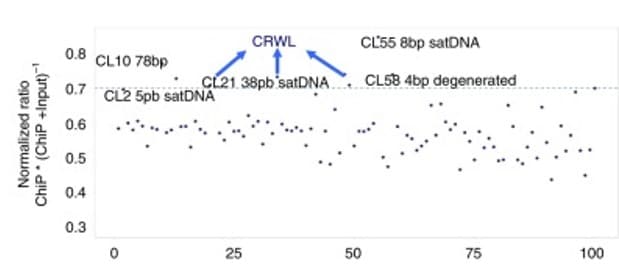ChIP Kit - Plants (ab117137)
Key features and details
- Assay type: Quantitative
- Assay time: 6 hr
Overview
-
Product name
ChIP Kit - Plants
See all ChIP Kit kits -
Assay type
Quantitative -
Assay time
6h 00m -
Species reactivity
Reacts with: Plants -
Product overview
Protein-DNA interactions play a critical role for cellular functions such as signal transduction, gene transcription and epigenetic silencing. In plants, interactions between the DNA-binding proteins and cognate promoter sequences are primary determinants in establishing spatial and temporal expression patterns of gene that affect homeostasis, development, and adaptation.
Abcam's ChIP Kit - Plants (ab117137) offers an advantageous tool for identifying direct genome-wide associations between specific regulatory proteins and their target genes in plant cells within 6 hours. The kit is suitable for combining the specificity of immunoprecipitation with qualitative and quantitative PCR, MS-PCR, DNA sequencing and southern blot, as well as DNA microarray.
This kit is designed for 24 or 48 ChIP reactions, not for 24 or 48 samples. The standard protocol of the kit allows for performing 8 reactions with one sample. For testing more samples, the amount of each sample should be reduced. The amount of each reagent used for chromatin preparation should be also proportionally reduced.
-
Notes
ChIP assay products and guides
Find more ChIP assay / chromatin immunoprecipitation resources and products, ChIP antibody products, and other ChIP assay kits and related reagents.
-
Tested applications
Suitable for: ChIPmore details
Properties
-
Storage instructions
Please refer to protocols. -
Components 24 tests 48 tests 100X Protease Inhibitor Cocktail 1 x 25µl 1 x 50µl 5X Lysis Buffer I 1 x 12ml 1 x 24ml 8-Well Assay Strips (with Frame) 3 units 6 units 8-Well Strip Caps 3 units 6 units Antibody Buffer 1 x 15ml 1 x 30ml Anti-H3K9me2 (1 mg/mL) 1 x 5µl 1 x 8µl Binding Buffer 1 x 5ml 1 x 8ml ChIP Dilution Buffer 1 x 2ml 1 x 6ml DNA Release Buffer 1 x 2ml 2 x 2ml Elution Buffer 1 x 0.6ml 1 x 1.2ml F-Collection Tube 30 units 50 units F-Spin Column 30 units 50 units Lysis Buffer II 1 x 3ml 1 x 6ml Lysis Buffer III 1 x 2ml 1 x 4ml Lysis Buffer IV 1 x 1.5ml 1 x 5ml Normal Mouse IgG (1 mg/mL) 1 x 10µl 1 x 10µl Proteinase K (10 mg/mL) 1 x 25µl 1 x 50µl Reverse Buffer 1 x 2ml 2 x 2ml Wash Buffer 1 x 28ml 2 x 28ml -
Research areas
Applications
The Abpromise guarantee
Our Abpromise guarantee covers the use of ab117137 in the following tested applications.
The application notes include recommended starting dilutions; optimal dilutions/concentrations should be determined by the end user.
| Application | Abreviews | Notes |
|---|---|---|
| ChIP |
Use at an assay dependent concentration.
|
| Notes |
|---|
|
ChIP
Use at an assay dependent concentration. |
Images
-
 ChIP - ChIP Kit - Plants (ab117137)Image from Hufnagel et al., Nat Commun.;11(1):492. doi: 10.1038/s41467-019-14197-9. Reproduced under the Creative Commons license https://creativecommons.org/licenses/by/4.0/
ChIP - ChIP Kit - Plants (ab117137)Image from Hufnagel et al., Nat Commun.;11(1):492. doi: 10.1038/s41467-019-14197-9. Reproduced under the Creative Commons license https://creativecommons.org/licenses/by/4.0/Repeated elements abundance in White Lupin genome. Chromatin immunoprecipitation experiments were done with ChIP Kit - Plants (ab117137). Sonicated chromatin-DNA ranging from 200-1000 bp was immunoprecipitated using anti-LalbCENH3. LalbCENH3-ChIPseq reads mapped against the first 100 RepeatExplorer clusters of the White Lupin genome. The main centromeric sequences found in LalbCENH3-ChIPseq are highlighted.
-
 ChIP - ChIP Kit - Plants (ab117137)Image from Kim et al., Front Plant Sci.,11:589707. doi: 10.3389/fpls.2020.589707. Reproduced under the Creative Commons license https://creativecommons.org/licenses/by/4.0/
ChIP - ChIP Kit - Plants (ab117137)Image from Kim et al., Front Plant Sci.,11:589707. doi: 10.3389/fpls.2020.589707. Reproduced under the Creative Commons license https://creativecommons.org/licenses/by/4.0/ORE1 promoter-binding activity of GIGANTEA in the elf4 mutant relative to that in the wild type at amplicons 1, 2, and 3. ChIP assays were performed using the ChIP Kit-Plants (ab117137). Chromatin was immunoprecipitated using anti-GFP antibody (ab290)-bound assay plate for 90 min. The resulting immunoprecipitated DNA was subjected to qPCR to examine the enrichment of target genes. Three biological replicates were performed. Asterisks indicate significant differences (*p < 0.05, **p < 0.01, ***p < 0.005; Student's t-test).
Datasheets and documents
-
SDS download
-
Datasheet download
References (8)
ab117137 has been referenced in 8 publications.
- White DWR PEAPOD repressors modulate and coordinate developmental responses to light intensity in Arabidopsis. New Phytol 235:1470-1485 (2022). PubMed: 35510737
- Schwope R et al. Open chromatin in grapevine marks candidate CREs and with other chromatin features correlates with gene expression. Plant J 107:1631-1647 (2021). PubMed: 34219317
- Hufnagel B et al. High-quality genome sequence of white lupin provides insight into soil exploration and seed quality. Nat Commun 11:492 (2020). PubMed: 31980615
- Qin M et al. Seed-Specific Overexpression of SPL12 and IPA1 Improves Seed Dormancy and Grain Size in Rice. Front Plant Sci 11:532771 (2020). PubMed: 33013960
- Li W et al. Three STIGMA AND STYLE STYLISTs Pattern the Fine Architectures of Apical Gynoecium and Are Critical for Male Gametophyte-Pistil Interaction. Curr Biol 30:4780-4788.e5 (2020). PubMed: 33007250
- Kim H et al. Subcellular Localization of GIGANTEA Regulates the Timing of Leaf Senescence and Flowering in Arabidopsis. Front Plant Sci 11:589707 (2020). PubMed: 33329652
- Shi C et al. Maternal control of suspensor programmed cell death via gibberellin signaling. Nat Commun 10:3484 (2019). PubMed: 31375676
- Baker K et al. Chromatin state analysis of the barley epigenome reveals a higher order structure defined by H3K27me1 and H3K27me3 abundance. Plant J N/A:N/A (2015). PubMed: 26255869
